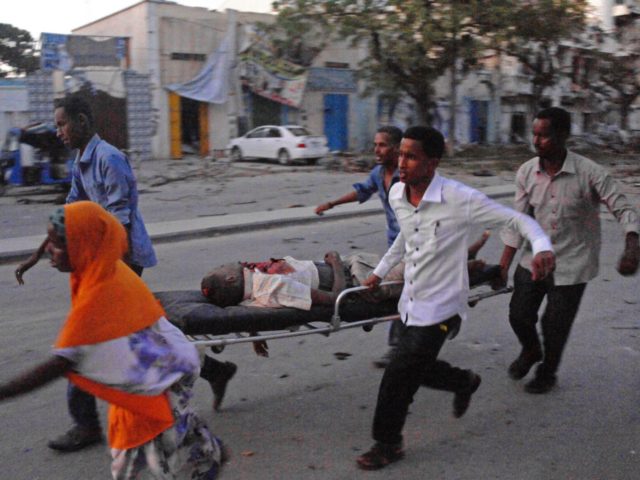Al-Qaeda’s Somali branch al-Shabaab, currently under pressure from a record number of U.S. airstrikes, has executed 18 people since last Wednesday, including many accused of espionage on behalf of regional governments and the United States, Voice of America (VOA) reported Monday.
VOA notes that the recent killings ordered by an al-Shabaab (or al-Shabab) court mark “an unprecedented rate of executions for the group.”
Of the 18 people killed, al-Shabaab reportedly accused 15 men and one woman of either being Somali soldiers or spies for Somalia, neighboring Kenya, and the United States. The remaining two include an 18-year-old man who maintained his innocence as he was stoned to death for allegedly raping a 16-year-old and another man accused of engaging in sorcery.
Al-Shabaab reportedly carried out the executions publicly to intimidate the local population.
VOA notes:
All of the victims were convicted by militant courts, according to al-Shabab affiliate media sites. Al-Shabab courts do not allow lawyers to represent the defendants, and the evidence largely relies on alleged confessions. Critics believe that al-Shabab’s militias torture the accused to force the confessions.
The killings came less than a month after Radio Dalsan, citing intelligence reports from the Somali government, revealed that U.S. President Donald Trump’s historic airstrike campaign against al-Shabaab has triggered infighting among the jihadi group and may also be pushing the terrorists into a peace agreement with Mogadishu.
President Trump intensified U.S. airstrikes against the militants soon after taking office, marking a significant departure from the previous administration.
In 2017, Trump signed an executive order to ramp up airstrikes against al-Shabaab that ended restrictions imposed by former President Barack Obama.
Last year, U.S. airstrikes in Somalia resulted in the “third record high” annual death toll (326) for al-Shabaab jihadis, the New York Times learned from the Pentagon.
Al-Shabaab fatalities are reportedly on track this year to eclipse those from 2018. In March, the U.S. military reported that 110 American airstrikes had killed 800 al-Shabaab jihadis in Somalia since June 2017.
The Trump administration has boosted the number of U.S. airstrikes in Somalia to unprecedented levels, according to a tally by the Bureau of Investigative Journalism.
During his first year in office (2017), the Trump administration more than doubled the number of bombs dropped on al-Shabaab jihadis to 35, compared to the 14 airstrikes in 2016, the highest number under the last two administrations.
Already this year, the administration has carried out 46 airstrikes, exceeding the 45 dropped during all of 2018. That means U.S. airstrikes in Somalia have more than tripled under Trump.
The U.S. has been targeting al-Shabaab with airstrikes and ground raids since 2007. U.S. troops in Africa are only able to carry out offensive strikes in Somalia and Libya.
Acknowledging that al-Shabaab is adapting to the “increasingly lethal air campaign,” the Mogadishu-based Hiraal Institute noted in November 2018 that the Trump strikes led to a slight decline in the overall attacks by the jihadis.
The human rights group Amnesty International accused the Trump administration in March of lethal “war crimes” against “numerous” civilians, echoing claims by the terrorist group.
In April, U.S. military officials ultimately conceded that U.S. airstrikes killed a woman and a child in 2018 after stressing that American military operations had killed no civilians in response to the Amnesty report. The U.S. military blamed a reporting error for the discrepancy, saying that it only learned of the fatalities this year.
In March, Foreign Policy, citing data from non-governmental organizations and the United Nations, indicated that the upsurge in American airstrikes in Somalia had prompted hundreds of thousands of civilians to flee their homes, exacerbating the country’s humanitarian crises fueled by years of unrest.

COMMENTS
Please let us know if you're having issues with commenting.